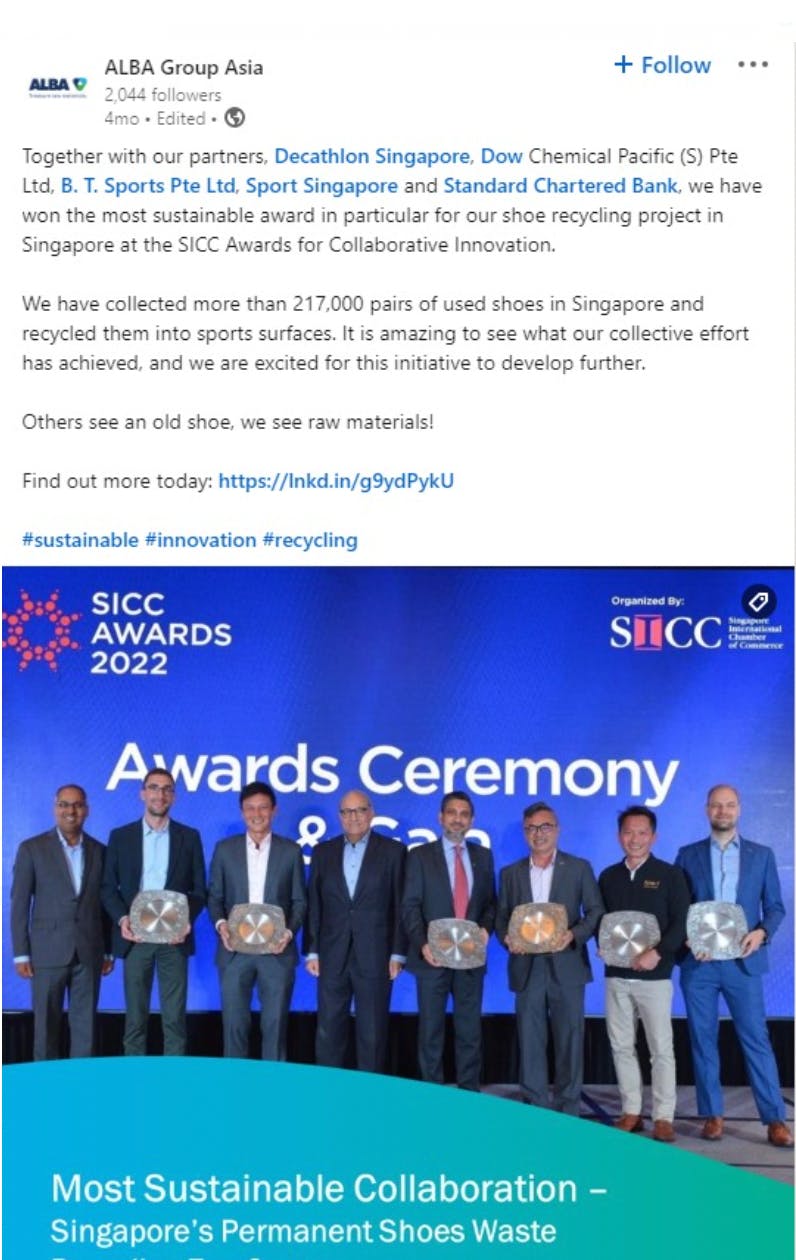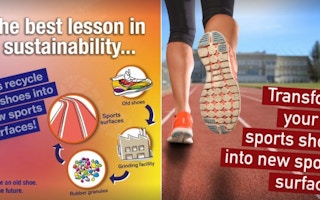A recycling programme in Singapore was compromised by “vulnerabilities” in the process chain that allowed donated shoes to be shipped to Indonesia for re-sale instead of recycled locally, according to the government agency responsible for the initiative.
To continue reading, subscribe to Eco‑Business.
There's something for everyone. We offer a range of subscription plans.
- Access our stories and receive our Insights Weekly newsletter with the free EB Member plan.
- Unlock unlimited access to our content and archive with EB Circle.
- Publish your content with EB Premium.
Investigative reporters from Reuters news agency electronically tracked shoes placed in recycling bins all over Singapore to flea markets in Indonesia, highlighting flaws in a programme that promised citizens their used shoes would be downcycled into material to build running tracks and playgrounds in the city-state.
None of the 11 pairs of shoes deposited in recycling bins located in different parts of the island went for recycling, and 10 of them were shipped to Indonesia, tracked by Reuters journalists using tags embedded in the midsoles of the shoes. The other pair is believed to have been stolen from one of the recycling bins.
Sports Singapore, a statutory board under the culture, community and youth ministry, which ran the project with Dow, a petrochemicals firms that produces materials used to make shoes, said that an investigation identified the weak link in the process chain to be Yok Impex, a local recyclables and reusables aggregator.

German waste management firm Alba’s post about winning a sustainability award for recycling 217,000 pairs of shoes into sports surfaces. Image: Alba Asia Pacific
Yok Impex had been sub-contracted to collect recycling bins, sort the shoes and send them to Alba-WH, a German waste management firm, which would send them on to another firm to grind the rubber and plastic parts of the shoes into building materials.
“The aggregation of the shoe bins in parallel with Yok Impex’s sorting activities resulted in some shoes being extracted for resale instead of recycling,” SportSG said in a consolidated press statement on behalf of all the partners involved, two days after Reuters ran the special report. It had previously referred questions filed by the media organisation to Dow.
Yok Impex has subsequently been removed from the programme, and SportSG has said it will be “taking further steps” to tighten up the process chain.
Where have the shoes run off to?
A degree of mystery surrounds the fate of shoes donated for the programme.
The programme, which has been running since 2019, had been promoted as an innovative initiative that would “divert” 170,000 pairs of shoes from landfill every year.
Dow, the major sponsor of the programme, has not clarified that the donated shoes would be recycled.
In promoting a sustainability award won in October 2022, Alba claimed that 217,000 pairs of shoes have been collected and recycled into sports surfaces to date. In a media statement yesterday, the firm said that 10,000 kilograms of used shoes have been recycled into infrastructure.
Alba has not responded to queries about the proportion of shoes donated for recycling that have actually been recycled.
Broken promises
Some observers have said that giving the shoes a second life in Indonesia instead of recycling them has environmental benefits, as recycling is an energy and water-intensive process.
But the programme was promoted as a recycling initiative by Dow and others to boost their green credentials. In a promotional video, Dow Singapore and Malaysia country director Paul Fong said the project created a circular economy for shoes in Singapore that helped ease the burden on the country’s landfill.
Also, sending secondhand goods to Indonesia is illegal, with an Indonesian official telling Reuters that used clothing poses a public health risk, undercut the country’s local textile industry and added to the country’s already groaning waste burden.
Jürgen Militz, managing director of circular economy consulting firm Recycling Partners, who previously worked with Alba in Singapore, said the programme may have been ecologically beneficial, as shoes were re-used, but was “bad PR” for recycling in Singapore.
A Singapore-based waste management expert, who declined to be named, said the exposé could undermine public trust in the country’s recycling system.
“I am constantly told that recycling is a lie. Here is another data point to prove it and I don’t know how to counter that criticism,” she said.
Singapore has a low recycling rate for a developed country, recycling 4 per cent of the plastic consumed compared to 27 per cent in Japan and 34 per cent in South Korea. Most of Singapore’s waste is incinerated. What little is sent for recycling is shipped overseas.
There is a need for more accountability for all types of recycling in Singapore, the recycling expert commented. “The statistics on recycling in Singapore are really just statistics on exports: when glass waste is exported, it gets counted as recycling. But we don’t know if that is true. It may be dumped.”
More scrutiny needed
Huileng Tan, who runs local anti-waste non-profit Zero Waste Singapore, said the shoe recycling drama highlighted the need for companies to “step up” their oversight of their value chains, and deliver on their commitment to consumers.
Dow has committed to convert plastic waste into 3 million tonnes of “circular and renewable” solutions by 2030 and enable 100 per cent of its packaging applications to be reusable or recyclable by 2035.
The US-based company is a key member of the Alliance to End Plastic Waste, an industry-led non-profit that has faced scrutiny for recycling programmes that have not come to fruition.

















